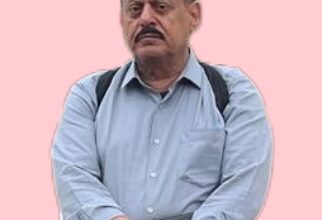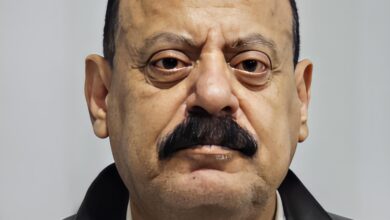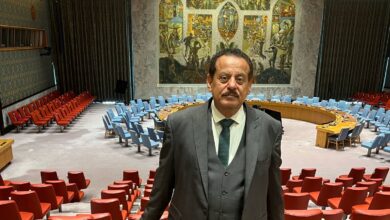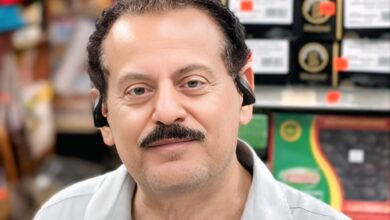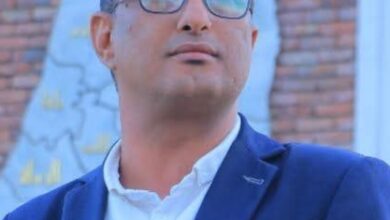Deprivation and Hardship

Yemenat
Ahmed Saif Hashed
Regret coiled around me like a serpent constricting its prey. Denial bared its fangs and claws in the face of my weary childhood. Reality frowned upon my small world, which had rights to play, frolic, and rejoice just like any other child.
Regret consumes my existence every time I feel that life still has joys to offer or when it tells us that it is worth living. I am surrounded by much sadness and weighed down by considerable pain.
I would see my peers playing and enjoying a normal life that I had longed for, while I was forbidden from any play or amusement except in limited measures, confined by restrictions, during times that darkened my spirit.
I was oppressed by commands and a power that resembled an inescapable fate.
Whenever God blessed our village with rain, and the walls flowed with water, my peers from my village and from “Al-Muraybah,” “Al-Qari’ah,” and “Al-Faqrah” would go swimming in what is called “Al-Qilt” in “Meynat Sharar,” while I was strictly forbidden to go there by an argument that left no room for discussion. I managed to visit it twice, almost miraculously, but since I hadn’t learned to swim, I nearly drowned, swallowing both water and algae in the process.
I was often punished for failing to pray, yet I was never taught to swim—a paradox I experienced in a childhood steeped in denial and deprivation.
My peers would attend weddings, near and far, dancing to drums, songs, and sweet melodies. The children would rejoice and enjoy themselves, while I, filled with regret, would hear the distant sound of drums and the singing of the performers, wishing fervently to be present.
I wished even more to be an artist, a dancer, or a flute player.
My longing to attend weddings was crucified by prohibitions and restrictions.
I was only allowed to attend weddings on rare occasions, burdened by my great shyness.
I always felt deprived of the joy and happiness I craved, and the days were stingy in granting me even the slightest bit!
Even my attendance at a relative’s wedding was tainted by discomfort and distress.
I remember attending my cousin Abdu Farid’s wedding when someone, lacking modesty and with a sharp tongue, revealed my secret in front of everyone—that I did not go to school but instead went down to “Mojran” in “Amurb,” where we smoked cheap, smuggled cigarettes like “Marib” and “Yemen,” then returned as if we had come from school, while we never actually reached it.
We called what we did that day “hifsna.” When my father found out, he punished me severely.
Perhaps my father was right to some extent, but I believe that the more just approach would have been for him to advise me gently and punish me with kindness. Maybe then I would have felt ashamed, or at least he could have disciplined me without severity, following up with love, tracking my steps and actions to help me overcome my situation.
What saddens me more today is that the very things I wished my father would do for me in the distant past, I have not done for some of my children today.
I try to find excuses for him, as I have become a father to seven sons and daughters, and I have drowned in my responsibilities, in myself, and in the public affairs that consume much of my time.
* * *
My peers include our neighbor Saeed Naman and his brother Ahmed, my cousins Bakeel, Abdu, and Saleh, my aunt’s son Hassan Ali Rajeh, and the children of Al-Murshidi, Salah Saleh, and the children of Yazid, “Al-Muraybah,” and the children of “Al-Hajar,” among others.
They play various ball games, from foot to “Al-Busayiah,” along with other games like “Al Aman and Al Habs,” “Al-Dowaes,” and “Al-Ghamaiah,” which were popular in those days.
Meanwhile, I was restricted so much that I felt my freedom to play was no greater than the space of a small cell, from which I tried to sneak a glance and breathe through a tiny hole.
Yet, I would seize any moment of my father’s distraction to escape his watchful eyes, darting away like a gazelle, immersing myself in play to the fullest. However, this indulgence was short-lived, and my father’s distractions were never long.
The joy I found in those moments was like a beautiful dream, abruptly cut short by a thunderous call that resembled my father’s voice.
He would soon realize I was missing and shout for me, and as soon as I returned, I would face swift and complete punishment—no installment, no delay—punishment for my minor rebellion against his authority and control.
I would occasionally take advantage of my father’s trips to the market or any distant destination to indulge in play without fatigue or boredom. Meanwhile, my kind grandmother, who was my father’s mother and suffered from a leg condition resembling gangrene, was confined to her home at the top of the hill.
From her vantage point, as soon as she saw my father returning through the valley, she would call me in a code only I understood. This was enough for me to rush home, appearing as the obedient child obeying my father’s orders not to leave the house or play in his absence.
Such stifling commands compelled me to lie, to hide, and to rebel against them within the limits of what was possible and available. If my secret were uncovered for any reason, I would endure the harsh consequences with patience and resilience. Perhaps this would lead me to another form of rebellion, a way to express to myself my refusal to submit to a paternal authority that seemed tyrannical.
I envied my peers as I watched their fathers treat them as equals, showering them with abundant affection. I still remember how Fattān interacted with his son Abdu al-Basit, and how Abdul Karim Haza’ would engage with his son Muhammad during their holiday in the village, while I chewed on my wounds, stuffing my subconscious with sorrow and regret, choking on my stifled tears, and being stabbed by pangs that felt like knives.
I would bitterly, almost choking on my emotions, ask my Lord: Why can’t my father be like those others? Why did this God not create me in another place in the universe, in a space other than my father’s house? What mattered most was that my mother was with me; I could not bear to be away from her.
I questioned myself: Why does my father treat me with such harshness, while other fathers are gentle and kind to their children, showing them respect and high regard, as if they were adults in their eyes?
Despite my rebellion, I never thought to record a vendetta against him in my writing; instead, I sought to find excuses for him, considering his circumstances, way of thinking, temperament, and mood, as well as the harsh reality we live in, the blatant alienation, the distorted upbringing, and the troubled or damaged awareness. Caught between the personal and the general, I found myself a victim, trapped in a harsher reality characterized by cruelty, violence, and alienation.
* * *
My father was burdened with a hectic life filled with stress and responsibilities that exceeded his and my mother’s capacity. The hardships and responsibilities were numerous: a shop, buying and selling throughout the day until late at night, and the care of my younger siblings, which also required considerable attention.
Additionally, there was the making and selling of sweets, farming the land, and the diverse tasks that changed with the seasons and harvests when they came.
I cannot forget that we had a cow, a donkey, an ox, and sheep, with countless responsibilities and details that weighed heavily on my tired parents.
At one stage in their lives, they were overwhelmed with work from dawn until nine at night, and sometimes later. I knew they were burdened with many tasks and the pressures of daily life. As the eldest sibling, I found myself sharing some of that responsibility.
My free time was limited, and playing with my peers was scarce or unavailable. Often, I would encounter an “Ottoman decree” from the high door saying, “Playing is forbidden,” and so I would comply, yet I would also rebel, regardless of the cost.
* * *


